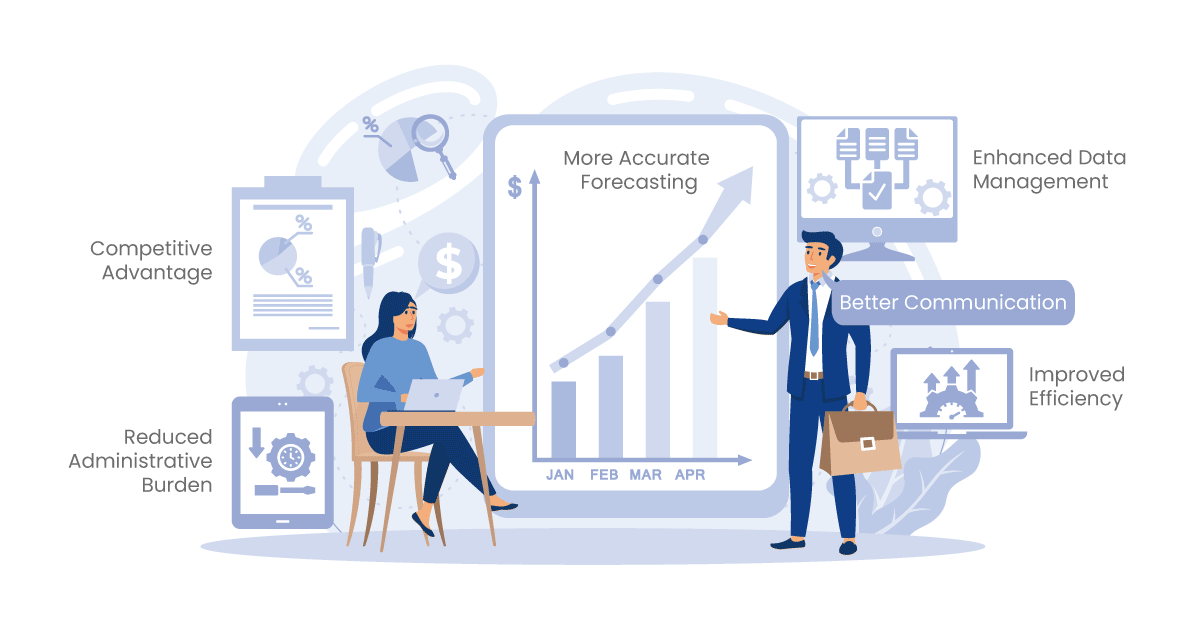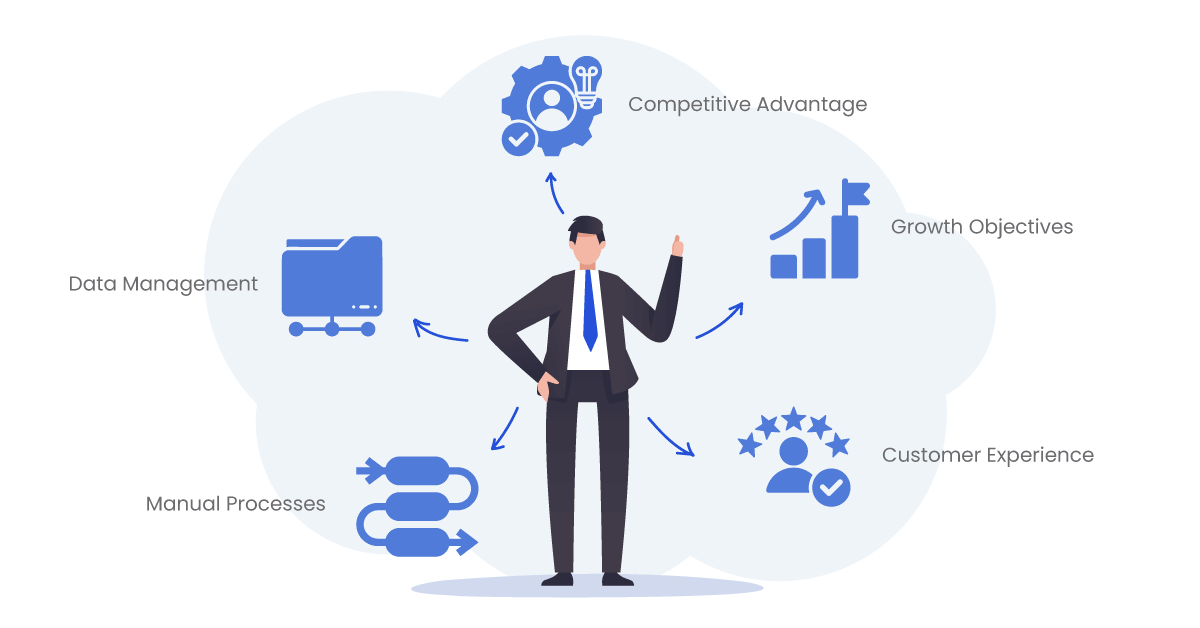As the world of sales continues to evolve, businesses must adopt new technologies and strategies to remain competitive. One technology that has gained significant popularity in recent years is Integration Platform as a Service (iPaaS). iPaaS is a cloud-based solution that enables businesses to connect various applications, systems, and data sources to streamline their operations.
Using iPaaS for sales operations can bring a wide range of benefits to your business. It can help you improve sales performance, enhance customer experience, and optimize your business processes. Additionally, it can save you time and money by automating tasks that would otherwise require manual effort.
Aonflow iPaaS – Free for First 3 Months!
Build and run up to 1,500 transactions monthly with no cost. No payment info needed!
In this blog, we will explore some of the key benefits of using iPaaS for sales operations. We’ll discuss how it can help you improve sales team productivity, increase visibility into your sales process, and make more informed business decisions. We’ll also share some real-life examples of businesses that have successfully implemented iPaaS for their sales operations.
Whether you’re a small business owner or a sales manager at a large corporation, understanding the benefits of iPaaS for sales operations is crucial. By the end of this blog, you’ll have a clear understanding of how this technology can help you achieve your sales goals and drive business growth. So, let’s dive in!
Let’s talk about challenges in sales ops without automation
Sales operations without automation can pose significant challenges to businesses. Some of the key challenges include:
Inefficient Processes: Manual sales processes can be time-consuming, error-prone, and can slow down the sales cycle. This can result in missed opportunities, delayed sales, and decreased revenue.
Data Silos: When sales data is spread across multiple systems and departments, it becomes difficult to get a complete view of the sales pipeline. This can lead to inaccurate forecasting and missed revenue targets.
Poor Communication: Without automation, communication between sales reps, managers, and customers can be fragmented and inconsistent. This can lead to misunderstandings, lost deals, and damaged relationships.
Limited Analytics: Without access to accurate and timely sales data, it can be challenging to analyze sales performance, identify trends, and make informed business decisions.
Increased Administrative Burden: Manual sales processes require more administrative effort, which can take sales reps away from their core responsibilities, such as selling and building customer relationships.
In today’s fast-paced business environment, these challenges can have a significant impact on a business’s bottom line. That’s why many businesses are turning to automation technologies, such as iPaaS, to help them streamline their sales operations and overcome these challenges.
The importance of sales ops automation
Sales operations automation is essential for businesses that want to remain competitive and maximize their sales performance. Here are some reasons why:
Improved Efficiency: Sales automation can help businesses streamline their sales processes, eliminate manual tasks, and reduce the time it takes to move leads through the sales funnel. This improves sales team productivity, frees up time for more strategic activities, and reduces the risk of errors.
Enhanced Data Management: Sales automation allows businesses to consolidate and manage their sales data in a centralized system. This provides a single source of truth for sales data and eliminates data silos, which can lead to inaccurate forecasting and missed revenue targets.
Better Communication: Sales automation facilitates better communication between sales reps, managers, and customers. It ensures that everyone is on the same page, reduces the risk of misunderstandings, and helps build stronger customer relationships.
More Accurate Forecasting: With sales automation, businesses can access real-time sales data and analytics. This allows them to make more accurate sales forecasts, identify trends, and adjust their sales strategy accordingly.
Reduced Administrative Burden: Sales automation reduces the administrative burden on sales reps and managers, freeing up time for more value-added activities, such as selling and building customer relationships.
Competitive Advantage: Businesses that leverage sales automation have a competitive advantage over those that don’t. They can respond to leads faster, close deals more efficiently, and provide a better customer experience, which can lead to increased revenue and market share.
Sales operations automation is essential for businesses that want to improve their sales performance, reduce costs, and stay ahead of the competition. By leveraging automation technologies, such as iPaaS, businesses can optimize their sales processes, improve data management, and build stronger customer relationships, all of which can lead to increased revenue and business growth.
What does sales ops automation entail?
Sales operations automation entails using technology to streamline and automate various aspects of the sales process, from lead generation to customer acquisition and beyond. Here are some common examples of sales ops automation:
Lead Management: Sales automation tools can help businesses manage their leads more efficiently, by automatically capturing leads from different sources, assigning them to the appropriate sales rep, and tracking their progress through the sales funnel.
Sales Process Automation: Sales automation can help businesses automate various sales processes, such as sending out follow-up emails, scheduling appointments, and generating quotes. This saves time for sales reps and ensures that leads are engaged throughout the sales process.
Customer Relationship Management: Sales automation tools can help businesses manage customer relationships more effectively, by tracking customer interactions, identifying upsell opportunities, and providing personalized support.
Sales Analytics: Sales automation tools can help businesses analyze sales data, identify trends, and make more informed business decisions. This can include tracking sales performance, forecasting revenue, and monitoring customer satisfaction.
Integration with Other Systems: Sales automation tools can integrate with other systems, such as marketing automation platforms, customer service software, and ERP systems. This helps businesses manage all aspects of the customer journey and provides a holistic view of their operations.
Overall, sales operations automation entails using technology to optimize the sales process, improve data management, and provide a better customer experience. By automating repetitive tasks and streamlining workflows, businesses can improve sales performance, reduce costs, and achieve their growth objectives.
Sales ops automation in a post-COVID world
The COVID-19 pandemic has dramatically changed the way businesses operate, including their sales operations. Sales teams have had to quickly adapt to remote work environments, virtual meetings, and digital selling. Sales operations automation has played a crucial role in enabling businesses to navigate these changes and stay competitive. Here are some ways in which sales ops automation has become even more important in a post-COVID world:
Remote Work: Sales automation tools have allowed sales teams to collaborate and communicate effectively in a remote work environment. They can access sales data and analytics from anywhere, track sales progress, and manage customer relationships virtually.
Digital Selling: Sales automation tools have made it easier for businesses to sell online, by automating the sales process, tracking online leads, and providing personalized support. This has become especially important as more customers are choosing to purchase products and services online.
Customer Experience: Sales automation tools have helped businesses provide a better customer experience in a post-COVID world. They can track customer interactions, provide personalized support, and identify upsell opportunities, all of which can improve customer satisfaction.
Sales Analytics: Sales automation tools have become even more critical for sales analytics in a post-COVID world. Businesses need to track sales performance, forecast revenue, and monitor customer satisfaction in real-time to respond to changes in the market and stay competitive.
Scalability: Sales automation tools have made it easier for businesses to scale their sales operations in a post-COVID world. They can automate repetitive tasks, streamline workflows, and manage sales data more efficiently, all of which can help businesses grow and expand their operations.
Sales ops automation has become even more important in a post-COVID world. It has enabled businesses to adapt to remote work environments, digital selling, and changing customer expectations, all of which are critical for staying competitive and achieving growth objectives. By leveraging automation technologies, such as iPaaS, businesses can optimize their sales processes, improve data management, and build stronger customer relationships, all of which can lead to increased revenue and business growth.
How to ascertain if you need to automate sales ops using iPaaS?
Implementing a sales operations automation strategy using iPaaS requires an investment of time and resources, so it is important to determine whether it is the right choice for your business. Here are some factors to consider when evaluating whether you need to automate your sales operations using iPaaS:
Manual Processes: If your sales operations rely heavily on manual processes, such as spreadsheets, email, or phone calls, you may benefit from sales ops automation. Automating manual tasks can reduce errors and save time, allowing your sales team to focus on more strategic activities.
Growth Objectives: If you are looking to grow your business and expand your sales operations, sales ops automation can help you scale more effectively. Automating processes can make it easier to onboard new sales reps, manage customer relationships, and track sales performance.
Data Management: If your sales data is scattered across different systems, such as CRM, ERP, and marketing automation platforms, sales ops automation can help you consolidate your data and manage it more efficiently. This can improve data accuracy, eliminate data silos, and provide a single source of truth for sales data.
Customer Experience: If you are looking to provide a better customer experience, sales ops automation can help you achieve this by providing personalized support, tracking customer interactions, and identifying upsell opportunities.
Competitive Advantage: If you want to stay ahead of the competition, sales ops automation can provide you with a competitive advantage by allowing you to respond to leads faster, close deals more efficiently, and provide a better customer experience.
If your sales operations rely heavily on manual processes, you are looking to grow your business, you have scattered sales data, you want to improve the customer experience, or you want to stay ahead of the competition, sales ops automation using iPaaS may be the right choice for your business. By automating repetitive tasks, streamlining workflows, and improving data management, you can optimize your sales operations, reduce costs, and achieve your growth objectives.
Sales operations automation
Sales operations automation refers to the use of technology and software to automate the processes and tasks involved in managing a company’s sales operations. Sales operations include everything from lead generation and qualification to sales forecasting, territory management, and customer relationship management. Automation can help sales teams streamline their processes, reduce errors, and focus on high-value activities, such as building relationships with customers and closing deals.
Sales operations automation can encompass a wide range of tools and technologies, including customer relationship management (CRM) software, marketing automation software, sales enablement tools, and integration platforms as a service (iPaaS). These tools can help sales teams automate tasks such as lead scoring, data entry, and reporting while providing real-time insights into sales performance and customer interactions.
One of the key benefits of sales operations automation is that it can help businesses achieve their growth objectives by scaling their sales operations more effectively. By automating repetitive tasks and streamlining workflows, businesses can free up time and resources to focus on more strategic activities, such as building relationships with customers and developing new products or services. Sales operations automation can also help businesses improve their data management, by consolidating sales data from different systems and providing a single source of truth for sales data.
Overall, sales operations automation can help businesses optimize their sales processes, reduce costs, and achieve their growth objectives. By leveraging technology and software, businesses can improve their sales operations, stay ahead of the competition, and provide a better customer experience.
What parts of sales operations should be automated using iPaaS?
Several parts of sales operations can be automated using iPaaS. Here are some examples:
Data Integration: Sales operations often involve working with data from multiple systems, such as CRM, ERP, and marketing automation platforms. iPaaS tools can help integrate data from these systems, providing a single source of truth for sales data and ensuring data accuracy.
Lead Management: iPaaS tools can help automate lead management processes, such as lead routing, lead scoring, and lead nurturing. This can help sales teams respond to leads faster and more efficiently, resulting in higher conversion rates and increased revenue.
Sales Forecasting: Sales forecasting is an essential part of sales operations, but it can be a time-consuming and error-prone process. iPaaS tools can help automate sales forecasting by aggregating data from different sources, such as historical sales data and market trends, and using algorithms to generate accurate sales forecasts.
Aonflow is the leading integration platform.
You can kick-start by integrating your first-ever workflow in just a matter of minutes.
Sales Reporting: Sales reporting can be a time-consuming task, but iPaaS tools can help automate this process by pulling data from different systems and generating reports automatically. This can help sales teams stay on top of their performance and identify areas for improvement.
Customer Relationship Management: iPaaS tools can help automate customer relationship management by consolidating customer data from different systems, such as CRM, marketing automation, and customer service platforms. This can provide a complete view of customer interactions and help sales teams provide personalized support to customers.
Order Management: Order management is a critical part of sales operations, and iPaaS tools can help automate this process by integrating data from different systems, such as ERP and inventory management platforms, to ensure timely and accurate order processing.
Overall, iPaaS tools can automate many parts of sales operations, helping sales teams work more efficiently, reduce errors, and provide a better customer experience. By streamlining workflows, improving data accuracy, and providing real-time insights into sales performance, iPaaS tools can help businesses optimize their sales operations and achieve their growth objectives.
Why Aonflow iPaaS for sales operations automation?
Aonflow iPaaS is an excellent choice for sales operations automation for several reasons.
Firstly, it is a cloud-based platform, which means that businesses can access it from anywhere, at any time, and on any device. This flexibility can help sales teams work more efficiently and collaborate more effectively, regardless of their location.
Secondly, Aonflow iPaaS offers a wide range of pre-built integrations with popular business applications, such as Salesforce. This can help businesses automate their sales operations quickly and easily, without the need for complex coding or customization.
Thirdly, Aonflow iPaaS is user-friendly, with a drag-and-drop interface that allows users to build and manage integrations easily. This can help businesses reduce their reliance on IT teams and empower sales teams to take control of their sales operations automation.
Fourthly, Aonflow iPaaS offers robust security features, such as data encryption and access controls, to ensure that businesses can trust their data with the platform. This can help businesses meet compliance requirements and protect their sensitive data from cyber threats.
Finally, Aonflow iPaaS offers real-time monitoring and analytics, which can help businesses track their sales performance and identify areas for improvement. This can help businesses optimize their sales operations and make data-driven decisions to achieve their growth objectives.
In summary, By leveraging these features, businesses can automate their sales operations effectively, reduce costs, and achieve their growth objectives.
Aonflow iPaaS – Free for First 3 Months!
Build and run up to 1,500 transactions monthly with no cost. No payment info needed!


